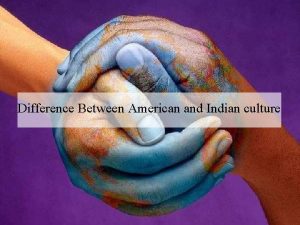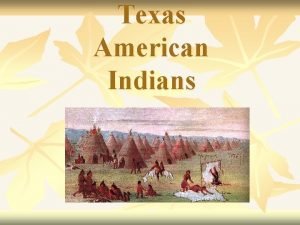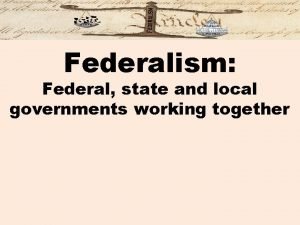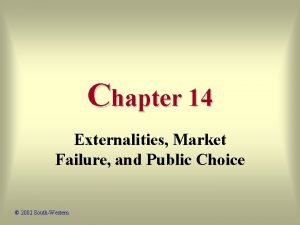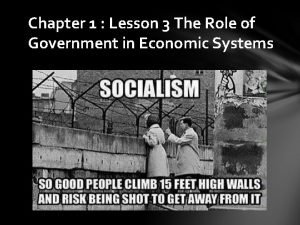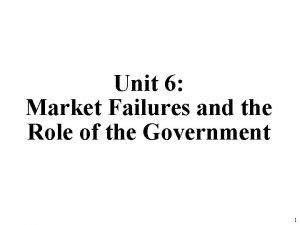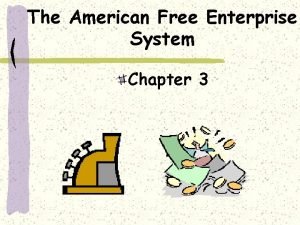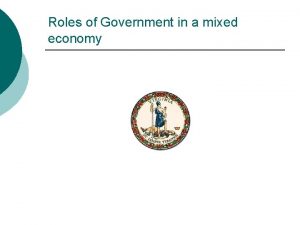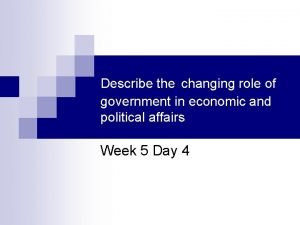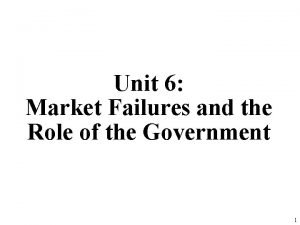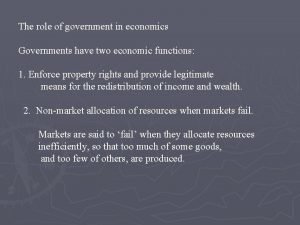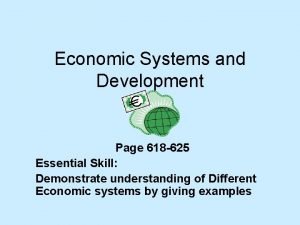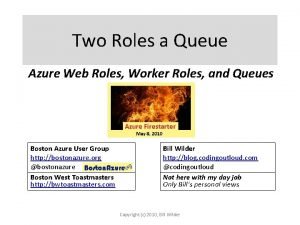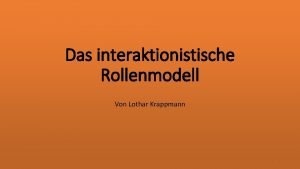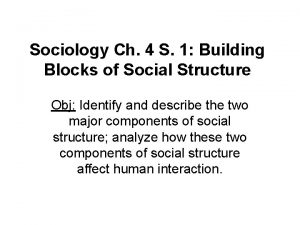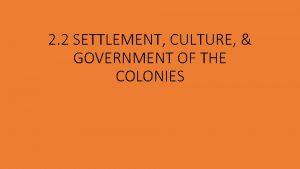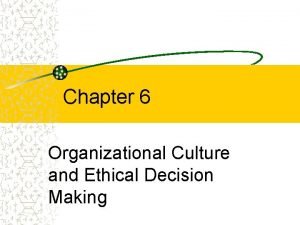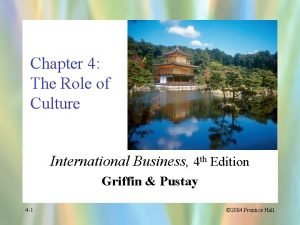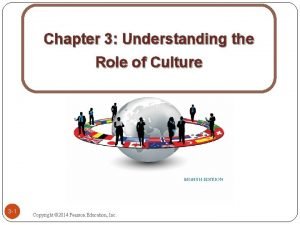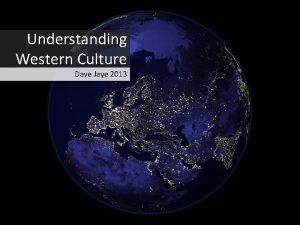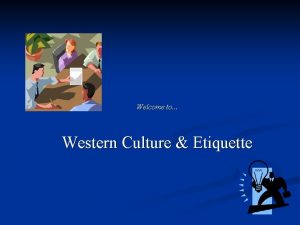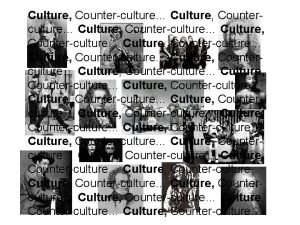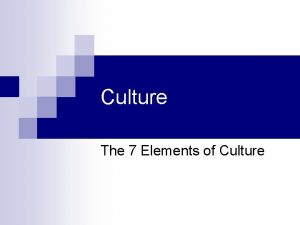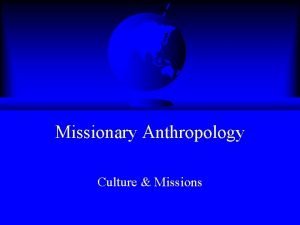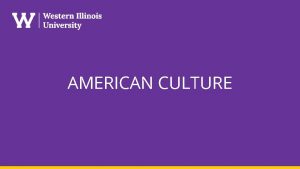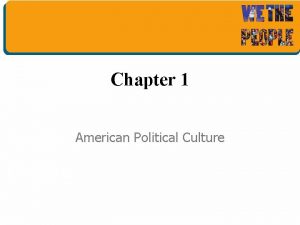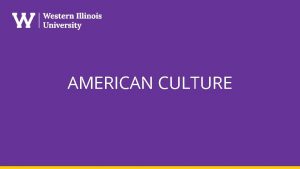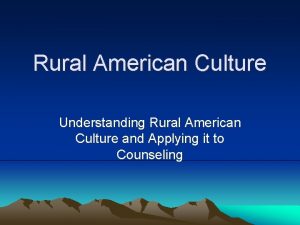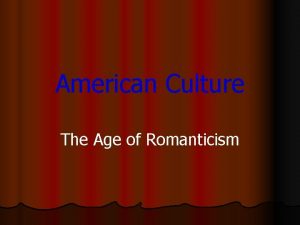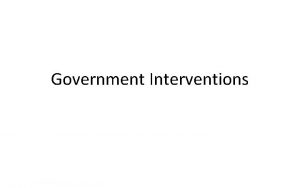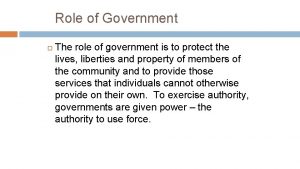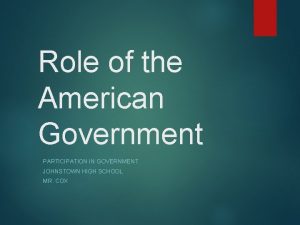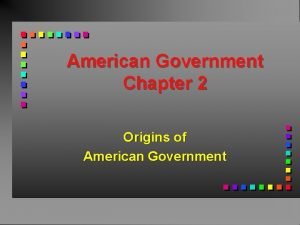Role of Western Culture in American Government Western




















- Slides: 20

Role of Western Culture in American Government

Western Civilization • Western culture, sometimes equated with Western civilization, Western lifestyle or European civilization, is a term used very broadly to refer to a heritage of social norms, ethical values, traditional customs, belief systems, political systems, and specific artifacts and technologies that have some origin or association with Europe.



Why do you think England, France, and Spain had a great influence on the United States? Can you name 1 colony settled by each of these countries?


British Magna Carta • Written by English nobles in 1215 • King John was forced to sign it • Main Idea—the King’s power is • Established the basis of Limited not absolute Government in the United States • Laws apply to everyone—kings & • Freedom, justice, and liberty under common men the law • Accused criminals get their day in • Its legacy is evident in the U. S. court & witnesses have to be Constitution & Bill of Rights, produced to convict of crimes (no especially the 5 th Amendment trial by ordeal) • It also established the basis of religious freedom (1 st Amendment)


“Know that, having regard to God and for the salvation of our soul, and those of all our ancestors and heirs, and unto the honour of God and the advancement of the holy Church, and for the reform of our realm, by advice of our venerable fathers, Stephen archbishop of Canterbury, primate of all England cardinal of the holy Roman church, Henry archbishop of Dublin. . . ”

“In the first place we have conceded to God, and by this our present charter confirmed for us and our heirs for ever that the English church shall be free, and shall have her rights entire, and her liberties inviolate; and we wish that it be thus observed. ”

“No freeman shall be arrested or imprisoned or have his property seized or outlawed or exiled or in any other way harmed. Nor will we [the king] proceed against him, or send others to do so, except according to the lawful sentence of his peers and according to the Common Law. ”

John Locke • British philosopher, physician, and “Enlightenment thinker” • Two Treatises of Government rejected the belief of the divine right of kings • Main idea—a ruler gains authority through the “consent of the governed” • The main duty of government is to protect the life, liberty, & property of people • Thomas Jefferson & James Madison greatly respected his thoughts on government

English Bill of Rights (1689) • The British people forced William & Mary to sign these protections before they could take throne of England • The former ruler, King James II, had used his authority to unjustly try to stamp out Protestantism during his reign • Main Ideas—(1) The King cannot levy taxes without Parliament’s consent (2) The King cannot nullify laws duly passed by Parliament (3) British subjects cannot have their weapons (pistols/rifles) taken away (4) Parliament members should be freely elected (5) members of Parliament should have freedom of speech when debating issues (6) excessive bail, fines, and cruel & unusual punishments should not be inflicted on law breakers

Whereas the late King James the Second, by the assistance of divers evil counsellors, judges and ministers employed by him, did endeavour to subvert and extirpate the Protestant religion and the laws and liberties of this kingdom: By assuming and exercising a power of dispensing with and suspending of laws and the execution of laws without consent of Parliament; By levying money for and to the use of the Crown by pretence of prerogative for other time and in other manner than the same was granted by Parliament; By raising and keeping a standing army within this kingdom in time of peace without consent of Parliament, and quartering soldiers contrary to law; By causing several good subjects being Protestants to be disarmed at the same time when papists were both armed and employed contrary to law; By violating the freedom of election of members to serve in Parliament; And whereas of late years partial corrupt and unqualified persons have been returned and served on juries in trials, and particularly divers jurors in trials for high treason which were not freeholders; And excessive bail hath been required of persons committed in criminal cases to elude the benefit of the laws made for the liberty of the subjects; And excessive fines have been imposed; And illegal and cruel punishments inflicted;

That the pretended power of suspending the laws or the execution of laws by regal authority without consent of Parliament is illegal; That the pretended power of dispensing with laws or the execution of laws by regal authority, as it hath been assumed and exercised of late, is illegal; That levying money for or to the use of the Crown by pretense of prerogative, without grant of Parliament, for longer time, or in other manner than the same is or shall be granted, is illegal; That the raising or keeping a standing army within the kingdom in time of peace, unless it be with consent of Parliament, is against law; That the subjects which are Protestants may have arms for their defense suitable to their conditions and as allowed by law; That election of members of Parliament ought to be free; That the freedom of speech and debates or proceedings in Parliament ought not to be impeached or questioned in any court or place out of Parliament; That excessive bail ought not to be required, nor excessive fines imposed, nor cruel and unusual punishments inflicted; That jurors ought to be duly impaneled and returned, and jurors which pass upon men in trials for high treason ought to be freeholders; And that for redress of all grievances, and for the amending, strengthening and preserving of the laws, Parliaments ought to be held frequently.

Charles Secondat (Baron de Montesquieu) • French philosopher, lawyer, and Enlightenment thinker • The Spirit of the Laws called for a separation of power in government to prevent corruption of rulers • Montesquieu also advocated checks & balances between the branches of gov’t • James Madison (author of U. S. Constitution) used his ideas in Articles I - III

Mayflower Compact • The first document (Nov. 21, 1620) agreeing to self-government in America • The Pilgrims & others on the Mayflower ship signed it & swore their oath to God before “setting foot” on the soil of America • The Mayflower Compact was modeled on the Separatist Church Covenant (England) • The agreement bound the Pilgrims to a civil society according to their own laws • It gave the settlers of Plymouth Plantation a sense of mission & of being bound together in the sight of God • It was influential to the Oaths of Office that the President, Congress, &

Thomas Paine • English born political writer & philosopher • Pamphlet Common Sense recommended that the American colonies get their independence from England • Paine wanted to end the monarchy & establish a system of representative democracy in America

The America Creed • I believe in the United States of America as a government of the people, by the people, for the people. Whose just powers are derived from the consent of the governed. A democracy in a Republic; a sovereign nation made of many sovereign states; a perfect Union one & inseparable—founded upon those principals of freedom, equality, justice, and humanity for which American patriots gave their lives & fortunes. I therefore believe it is my duty to my country to love it, support its Constitution, obey its laws, respect its flag, and to defend it against all enemies.

 Indian culture vs american culture
Indian culture vs american culture Western gulf culture
Western gulf culture Gulf culture clothing
Gulf culture clothing National government vs federal government
National government vs federal government Role of government in correcting market failure
Role of government in correcting market failure Lesson 3 the role of government in economic systems
Lesson 3 the role of government in economic systems Unit 6 four market failures
Unit 6 four market failures Lesson 1 american free enterprise capitalism
Lesson 1 american free enterprise capitalism 3 roles of government in a mixed economy
3 roles of government in a mixed economy Changing role of government in the economy
Changing role of government in the economy Unit 6 market failures and the role of the government
Unit 6 market failures and the role of the government Economic role of government
Economic role of government Role of government in economic development
Role of government in economic development What is the role of government in disaster management
What is the role of government in disaster management Azure web role worker role example
Azure web role worker role example Krappmann role taking
Krappmann role taking Statuses and their related roles determine the structure
Statuses and their related roles determine the structure Lesson 2 settlement culture and government of the colonies
Lesson 2 settlement culture and government of the colonies The role of corporate culture in ethical decision making
The role of corporate culture in ethical decision making Importance of culture in international business
Importance of culture in international business Understanding the role of culture
Understanding the role of culture
